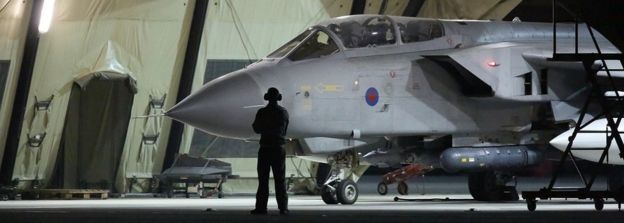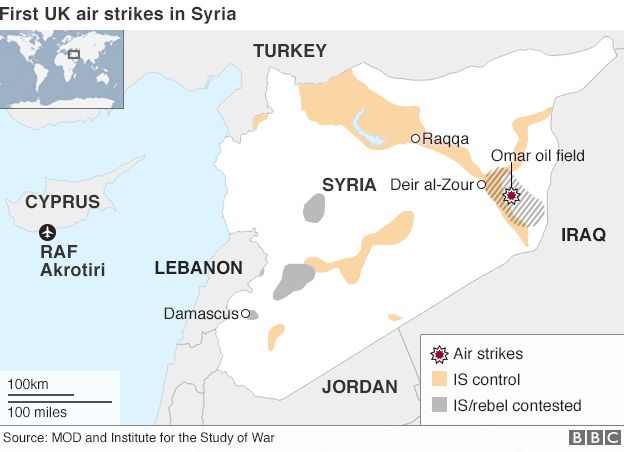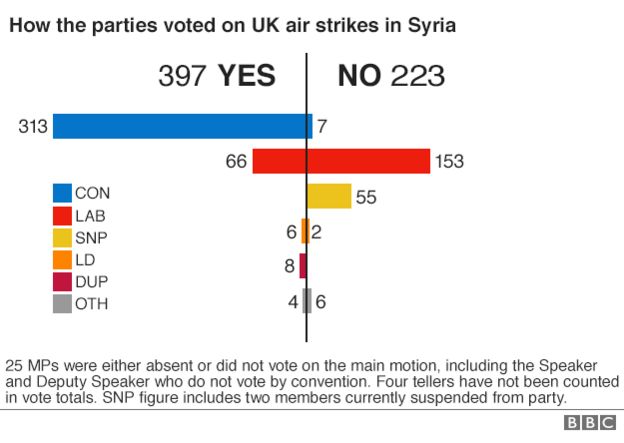The mission to target so-called Islamic State militants in Syria could take “some time” and will require persistence, PM David Cameron has said.
RAF Tornados carried out their first air strikes in Syria, “successfully” targeting IS-controlled oil fields, the Ministry of Defence confirmed.
But the PM warned the operation would be complex and will require patience.
It comes as two additional Tornados and six Typhoons have been despatched to the region to take part in attacks.
Speaking after the first strikes, Mr Cameron said: “I think it’s good for the country. There was a compelling case for extending our air strikes from Iraq to Syria, and I was glad to see such strong support right across parliament.
“It is complex and it is difficult what we are asking our pilots to do, and our thoughts should be with them and their families as they commence this important work,” he added.
Oil fields targeted
MPs overwhelmingly backed UK military action against IS – also known as Daesh – in Syria, by 397 votes to 223, after a 10-hour Commons debate on Wednesday.
Defence Secretary Michael Fallon said the MoD would be assessing the damage done by the bombing later, saying he had personally approved the targets ahead of the Commons vote.
He said the aim was to strike “a very real blow on the oil and revenue on which Daesh depends”.
BBC security correspondent Frank Gardner said the IS-controlled Omar oilfield – a target of the UK air strikes – was one of eight oilfields targeted by coalition forces.
- UK air strikes on IS in Syria: Live updates
- Key quotes and clips from the debate
- Syria air strikes: What you need to know
- How did your MP vote?
- What weapons does the coalition have?
Mr Fallon confirmed two Tornados and six Typhoons were being sent to join the eight jets already at the RAF Akrotiri base in Cyprus, from where UK operations in Iraq have been launched.
The Typhoons left RAF Lossiemouth in Moray, Scotland, to join the air strikes.
The view from Damascus

By BBC chief international correspondent Lyse Doucet
This morning’s newspapers in Damascus reiterate criticism Syrian officials have made for years about the West’s engagement here.
“Britain didn’t ask permission from Syria’s government,” declares the state news agency SANA. “Cameron told lies,” it says.
Syrian officials insist Britain and its allies must follow Russia’s example and co-ordinate their campaign with Syrian government forces. If they don’t, they warn, they simply won’t succeed.
The deadlock over President Assad’s future role will continue to block the formation of a unified command against a common enemy. It will also stand in the way of Britain’s pledge that it will now also focus on finding a negotiated way out of this war.
Syrian activists and opposition groups feel bitterly let down that the West did not give them this kind of military support to help remove President Assad.
And the many Syrians exhausted by war want, most of all, to believe Britain’s promise that it’s stepping up the fight to “win the peace” – as hard as that is.
Syrian state media reacts with scorn
Mr Fallon said there was a “very rigorous” process by which targets were chosen, and all British military action would adhere to “very strict rules of engagement”.
Asked how long the UK might be involved in the coalition campaign against IS in Syria, he said it would “not be quick”, but argued it had not been right to leave bombing to other air forces.
On the issue of ground forces, he said the prime minister of Iraq had made it very clear he did not want Western troops on the ground to fight IS.

In a statement, the MoD said the British jets – supported by a Voyager air refuelling tanker, an unmanned Reaper drone and other coalition aircraft – had attacked six targets.
“Carefully selected elements of the oilfield infrastructure were targeted, ensuring the strikes will have a significant impact on Daesh’s ability to extract the oil to fund their terrorism,” it said.
Before the attacks, pilots used the aircrafts’ sensors to confirm “no civilians were in the proximity of the targets”, it stated.
Air strikes were launched shortly after Parliament approved UK military action in Syria, after Wednesday’s Commons debate.
A total of 66 Labour MPs – 29% of the parliamentary party – sided with the government as it secured a larger than expected Commons majority.
The RAF has been carrying out operations against IS in Iraq since last year.
To date, the US has conducted nearly all of the air strikes in Syria and Iraq, with France, Australia and Denmark also taking part.

BBC
 Q FM Africa's Modern Radio
Q FM Africa's Modern Radio
